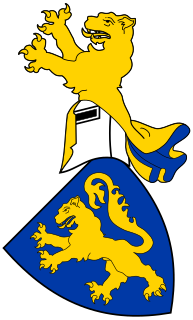
Stephen II was the Bosnian Ban from 1314, but in reality from 1322 to 1353 together with his brother, Vladislav Kotromanić in 1326–1353. He was the son of Bosnian Ban Stephen I Kotromanić and Elizabeth, sister of King Stefan Vladislav II. Throughout his reign in the fourteenth century, Stephen ruled the lands from Sava to the Adriatic and from Cetina to Drina. He was a member of the Kotromanić dynasty. He was buried in his Franciscan church in Mile, near Visoko, Bosnia.
Tvrtko of Bosnia may refer to:
Stephen Kotromanić may refer to:

The Kotromanić were members of a late medieval Bosnian noble and later royal dynasty. Rising to power in the middle of the 13th century as bans of Bosnia, with control over little more than the valley of the eponymous river, the Kotromanić rulers expanded their realm through a series of conquests to include nearly all of modern-day Bosnia and Herzegovina, large parts of modern-day Croatia and parts of modern-day Serbia and Montenegro, with Tvrtko I eventually establishing the Kingdom of Bosnia in 1377. The Kotromanić intermarried with several southeastern and central European royal houses. The last sovereign, Stephen Tomašević, ruled briefly as Despot of Serbia in 1459 and as King of Bosnia between 1461 and 1463, before losing both countries – and his head – to the Ottoman Turks.
Vladislav of Bosnia was a member of the House of Kotromanić who effectively ruled the Banate of Bosnia from September 1353 to his death.

Csák was the name of a gens in the Kingdom of Hungary.
Mladen II Šubić of Bribir, a Croatian leader and member of the Šubić noble family, was a Ban of Croatia and Lord of all of Bosnia. After succeeding his father Paul, he further consolidated the Šubić domain, and brought Stephen Kotromanić to administer Bosnia under his overlordship. His rule ended with a mutiny of Dalmatian cities and Croatian nobility in 1322 which further led to Mladen's imprisonment by king Charles I, whom the Šubićs had brought to the throne previously. Mladen strengthened the state and court institutions, and his rule led to the further development of the knightly culture in Croatia.
Catherine of Bosnia was a Bosnian noblewoman. She was Countess of Cilli by her marriage to Hermann I, Count of Cilli, and a member of the House of Kotromanić by birth.
Elizabeth of Serbia was Baness of Bosnia by her marriage to Stephen I, Ban of Bosnia.
The Battle of Bliska was fought in 1322 between the army of a coalition of several Croatian noblemen and Dalmatian coastal towns and the forces of Mladen II Šubić of Bribir, Ban of Croatia, and his allies. The battle resulted in the defeat of Mladen II, who lost his power.

Donji Kraji or Hungarian: Olfeld, Latin: Partes inferiores, was a small medieval region in present-day northwestern Bosnia and Herzegovina, on the southwestern size of Bosanska Krajina.

Rátót was the name of a gens in the Kingdom of Hungary. According to Simon of Kéza and other chroniclers, the ancestors of the clan were Italians from Caserta, Naples, by name Rathold and Oliver, who settled down in Hungary around 1097 during the reign of Coloman, King of Hungary. They came to Hungary alongside Felicia of Sicily.
The Babonić was a noble family from medieval Slavonia whose most notable members were Bans (viceroys) of Slavonia and Croatia. Their rise began at the turn of the 12th and 13th centuries when they received enormous estates from the Kings of Hungary. They were related to the Counts of Gorizia, the Venetian Morosini family and the Bosnian Kotromanić through intermarriages.

An oligarch or provincial lord was a powerful lord who administered huge contiguous territories through usurping royal prerogatives in the Kingdom of Hungary in the late 13th and early 14th centuries.
Monoszló was the name of a Slavonian-origin gens in the Kingdom of Hungary, several prominent secular dignitaries came from this kindred.
Prijezda Kotromanić may refer to:








